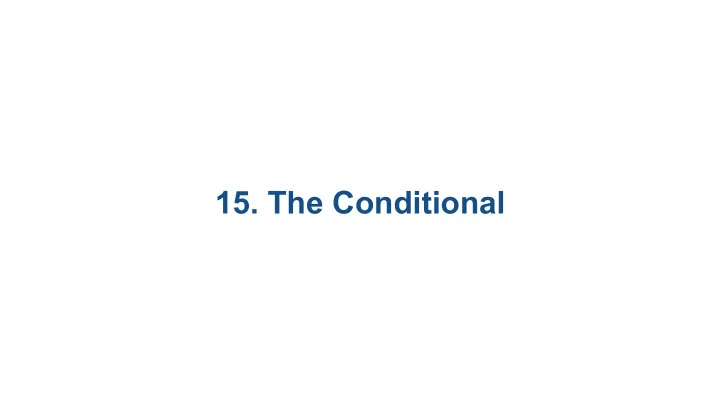

15. The Conditional
15.1 The conditional: Formation and uses 15.2 Mise en pratique
15.1 The Conditional: Formation and Uses
Mme Legendre is talking to a friend about her hopes and wishes for the future: “Un jour, j’aimerais changer de travail et avoir plus de responsabilités. J’aurais aussi un meilleur salaire et, avec mon mari, nous pourrions acheter la maison dont nous rêvons!”
The conditional consists of a stem and a series of endings you are already familiar with: (1) The stem is the same as that used in the future simple (Module 9), whether the verb is regular or irregular. (2) The endings correspond to those used in the imparfait (Module 8)
Aimer Stem: Aimer— J’aimerais Tu aimerais Il/Elle/On aimerait Nous aimerions Vous aimeriez Ils/Elles aimeraient
Verb Verb Verb (infinitive) (future) (conditional) Make sure you know the future-tense conjugations Nous Être Je serai of regular and common serions irregular verbs, as you Aller J’irai Vous iriez will need the stem of the verb at the future to conjugate correctly at the Avoir J’aurai Elle aurait conditional. Ils Prendre Je prendrai prendraient
The conditional is used to mention events that are not guaranteed to occur, as they are often dependent on certain conditions. The English equivalent is ‘would’ followed by the main verb: Il travaillerait s’il était motivé. He would work if he were motivated
The conditional is mostly used to express what would happen if a condition were met. Si nous étions plus riches, nous aurions une belle maison. If we were rich, (then) we would have a nice house. Note that the conditional is in the result (‘then’) part of the clause, not the clause that follows si (‘if’).
In complex sentences that include a clause beginning with si (‘if’), the verb in the si clause is conjugated at the imparfait and introduces a hypothetical situation. The verb in the other clause is at the conditional and expresses what would/ could happen.
Si j’étais (imp.) plus jeune, je voyagerais (cond.) (‘If I were younger, I would travel’). Si nous avions (imp.) du temps, nous irions (cond.) en France pendant un mois (‘If we had time, we would go to France for a month’).
The conditional forms of the verbs aimer , vouloir and pouvoir , followed by an infinitive, are also used to make polite requests:
Pourriez-vous fermer la fenêtre, s’il vous plaît? (‘Could you please close the window?’) Aimeriez-vous venir au restaurant avec nous? (‘Would you like to come to the restaurant with us?’) Voudrais-tu m’aider? (‘Would you like to help me?’)
15.2 Mise En Pratique
1. Based on the infinitive of the verbs, find their future and conditional conjugations with the indicated pronouns: Infinitive Future Conditional Aller Tu __________________ Nous __________________ Partir Je __________________ Vous __________________ Savoir Il __________________ Tu __________________ Avoir Elle __________________ Elles __________________ Marcher Nous __________________ Je __________________
Recommend
More recommend